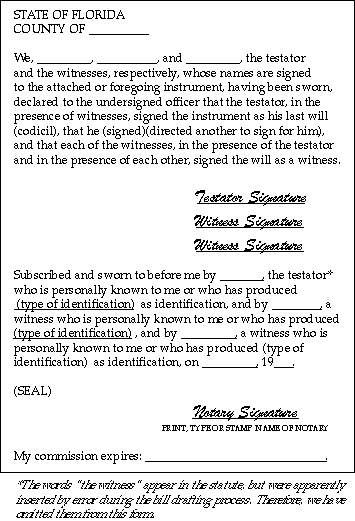May I notarize a will that has not been prepared by an attorney? What does it mean to make a will "self-proving"?
Yes, you may notarize a will, whether prepared by an attorney or not, provided the required conditions for a notarization are met.
- The document
signer must be present and competent to execute the document.
- The signer
must be personally known to you or produce appropriate identification.
- The document must have a jurat, or the document signer must direct you to provide a jurat.
Making a will self-proving shortens and simplifies the steps of probate. Section 732.503, Florida Statutes, prescribes the method by which a will (or an addendum to an existing will, known as a codicil) may be self-proved. The process involves the testator and witnesses taking an oath and signing an affidavit stating that they signed the will in the presence of each other. The notary is responsible for administering an oath to the testator and the witnesses, and for completing the jurat.

Witnesses
The notary does not have the responsibility of furnishing two witnesses for the execution of a self-proving will, or any other document.
Because the witnesses' signatures are also notarized on a self-proved will, the notary may not serve as one of the witnesses. This also eliminates the notary's spouse, son, daughter, mother, or father from being one of the witnesses.
The above affidavit is the form prescribed in §732.503, Florida Statutes.